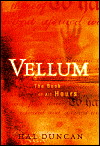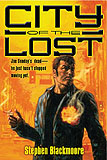
Vellum, by Hal Duncan
Book Review by James Michael White
Have you read this book?
Hal Duncan's Vellum is one of those all-too-rare novels that reaffirms one's faith in genre's ability to produce stellar and innovative work. Though it seems to be just another retelling of the oft-told tale of theomachy, this strife among gods has more to say about the nature of humanity and, indeed, the gods themselves, than a mere retelling.
With a vigorous nod to William S. Burroughs' cut-up and fold-in technique (though not quite that, more coherent than that), Duncan shuffles characters between 2017, World War I, World War II, and ancient Sumeria with ease, making it quite clear who is who in each of those times and that, really, the soul remains constant no matter the name it wears nor the time in which it may find itself.
Among these souls are puckish Thomas Messenger, seeking to flee the war among gods -- combatants here identified as including angels and demons -- by vanishing into the Vellum, the underlying reality of all things whose physical embodiment is The Book of All Hours, the book in which it is said all of creation is written as dictated by God to humble angelic scribe, Metatron. Metatron, though, has designs all his own regarding the nature of the world and reality, operating as a fallen angel out to establish a new order. Yet to do that he must sway as many other angels and forgotten gods as will join him. You see, angels, demons, gods ... they're all alike, each of them empowered by the Cant, a language which is the force of creation, each of these being marked by a sigil, a graving which establishes them in reality as firmly as, say, writing a name in a book.
Standing in Metatron's way are the likes of Thomas and his sister, Phreedom Messenger, hippie offspring made newly conscious of their own powers who want neither to join Metatron nor oppose him, but rather go their own, neutral way.
Also standing in his way is the very interesting Irish fellow, Seamus Finnan, whose memories of World War I, what it required of him and what it did to him, despite promises to his sweetie back home, offer some of the most poignant work seen in fiction in a long time. Alongside Finnan, too, appears the enigmatic Mad Jack Carter, who may prove to be the wildest card in this multi-hued Tarot deck whose various parts are shuffled and reshuffled time-wise and place-wise not merely to dodge storytelling linearity, but to further enhance what the story has to say about reality, that it is interchangeable, and that the Ur story, infinitely permutable, remains ever the same, no matter the form it may take. This kind of shuffling, combined with the extremely short bits and pieces of fragmented narrative, helps clarify frequent shifts in perspective, lets many of the pieces that could well hang together in longer bits end on powerful lines, and draws still further attention to the often just as well-wrought first lines.
All of these tricks, combined with frequent use of captions/titles, creates a narrative that is just as physically fragmented as the worlds it depicts, while at the same time coming off looking like an epic poem whose greater meters and internal ones possess an incantational quality, repetitions of various forms of the Ur story functioning in songlike fashion of verse/chorus, verse/chorus, whose passages build in a manner akin to a literary bolero, each repetition adding new layers to build upon the central, and a few other, themes.
And what are those themes? Let's say that Hal Duncan in Vellum is not so much telling a story as he is casting a spell, and that the spell is a very good one, an entertaining one, raging against all kinds of conformity, whether literary or social or mythological, in which expectations are reversed, sacred institutions thrown down, and in which the most vaunted spark of the divine is the will of individuality. To thine own self be true, then, no matter whom it torques off. (Or, to you Greekophiles, the variant that preceded it, ΓΝΩθΙ ΣEΑΥΤΟΝ, aka, gnothi seauton, aka, "know thyself".)
This is important, by the way. Part of what Vellum has to say is that the godhead is immanent within all; it is not something external to humanity, but within humanity itself, and Seamus Finnan goes so far as to make this point explicitly clear in one of the more declarative passages of the book. Gods, angels, demons ... they are all merely humans who heard the Cant and learned to speak it and who, thereby aided, overcome their mere humanity. Thus knowing thyself becomes the ultimate will to power, not merely a dodge against the powers that be. After all, what can be more godlike than saying a great big "shove off!" to everyone and everything and going your own way?
Okay, so there's a bit of Nietzsche-like anarchy, here. And much of what's afoot hearkens back to the days of New Wave bravura, with echoes not only of Burroughs and Ellison but who-knows-who-else among the great many others whose influence you will undoubtedly recognize. Doesn't really matter. In terms of style, story, and substance, Duncan has the whole kit, and for its mix-n-match hodgepodge of things old and new, Vellum manages to create something fresh.
Ah, but the ending, after all, isn't here. Not really. Sure, the book ends, but not quite the story. Lots of loose threads dangle, and for that I await the sequel, "Ink," to see if Duncan can pay out the promises made in an excellent debut and, at last, finish a promising story.
With a vigorous nod to William S. Burroughs' cut-up and fold-in technique (though not quite that, more coherent than that), Duncan shuffles characters between 2017, World War I, World War II, and ancient Sumeria with ease, making it quite clear who is who in each of those times and that, really, the soul remains constant no matter the name it wears nor the time in which it may find itself.
Among these souls are puckish Thomas Messenger, seeking to flee the war among gods -- combatants here identified as including angels and demons -- by vanishing into the Vellum, the underlying reality of all things whose physical embodiment is The Book of All Hours, the book in which it is said all of creation is written as dictated by God to humble angelic scribe, Metatron. Metatron, though, has designs all his own regarding the nature of the world and reality, operating as a fallen angel out to establish a new order. Yet to do that he must sway as many other angels and forgotten gods as will join him. You see, angels, demons, gods ... they're all alike, each of them empowered by the Cant, a language which is the force of creation, each of these being marked by a sigil, a graving which establishes them in reality as firmly as, say, writing a name in a book.
Standing in Metatron's way are the likes of Thomas and his sister, Phreedom Messenger, hippie offspring made newly conscious of their own powers who want neither to join Metatron nor oppose him, but rather go their own, neutral way.
Also standing in his way is the very interesting Irish fellow, Seamus Finnan, whose memories of World War I, what it required of him and what it did to him, despite promises to his sweetie back home, offer some of the most poignant work seen in fiction in a long time. Alongside Finnan, too, appears the enigmatic Mad Jack Carter, who may prove to be the wildest card in this multi-hued Tarot deck whose various parts are shuffled and reshuffled time-wise and place-wise not merely to dodge storytelling linearity, but to further enhance what the story has to say about reality, that it is interchangeable, and that the Ur story, infinitely permutable, remains ever the same, no matter the form it may take. This kind of shuffling, combined with the extremely short bits and pieces of fragmented narrative, helps clarify frequent shifts in perspective, lets many of the pieces that could well hang together in longer bits end on powerful lines, and draws still further attention to the often just as well-wrought first lines.
All of these tricks, combined with frequent use of captions/titles, creates a narrative that is just as physically fragmented as the worlds it depicts, while at the same time coming off looking like an epic poem whose greater meters and internal ones possess an incantational quality, repetitions of various forms of the Ur story functioning in songlike fashion of verse/chorus, verse/chorus, whose passages build in a manner akin to a literary bolero, each repetition adding new layers to build upon the central, and a few other, themes.
And what are those themes? Let's say that Hal Duncan in Vellum is not so much telling a story as he is casting a spell, and that the spell is a very good one, an entertaining one, raging against all kinds of conformity, whether literary or social or mythological, in which expectations are reversed, sacred institutions thrown down, and in which the most vaunted spark of the divine is the will of individuality. To thine own self be true, then, no matter whom it torques off. (Or, to you Greekophiles, the variant that preceded it, ΓΝΩθΙ ΣEΑΥΤΟΝ, aka, gnothi seauton, aka, "know thyself".)
This is important, by the way. Part of what Vellum has to say is that the godhead is immanent within all; it is not something external to humanity, but within humanity itself, and Seamus Finnan goes so far as to make this point explicitly clear in one of the more declarative passages of the book. Gods, angels, demons ... they are all merely humans who heard the Cant and learned to speak it and who, thereby aided, overcome their mere humanity. Thus knowing thyself becomes the ultimate will to power, not merely a dodge against the powers that be. After all, what can be more godlike than saying a great big "shove off!" to everyone and everything and going your own way?
Okay, so there's a bit of Nietzsche-like anarchy, here. And much of what's afoot hearkens back to the days of New Wave bravura, with echoes not only of Burroughs and Ellison but who-knows-who-else among the great many others whose influence you will undoubtedly recognize. Doesn't really matter. In terms of style, story, and substance, Duncan has the whole kit, and for its mix-n-match hodgepodge of things old and new, Vellum manages to create something fresh.
Ah, but the ending, after all, isn't here. Not really. Sure, the book ends, but not quite the story. Lots of loose threads dangle, and for that I await the sequel, "Ink," to see if Duncan can pay out the promises made in an excellent debut and, at last, finish a promising story.
|
Click here to buy Vellum, by Hal Duncan on Amazon
|
Vellum, by Hal Duncan on Amazon

| More Books You Might Like |
Comment on Vellum, by Hal Duncan
| Comments on Vellum, by Hal Duncan |
| There are no comments on this book. |




